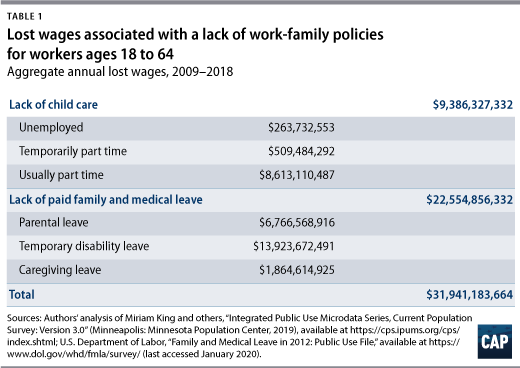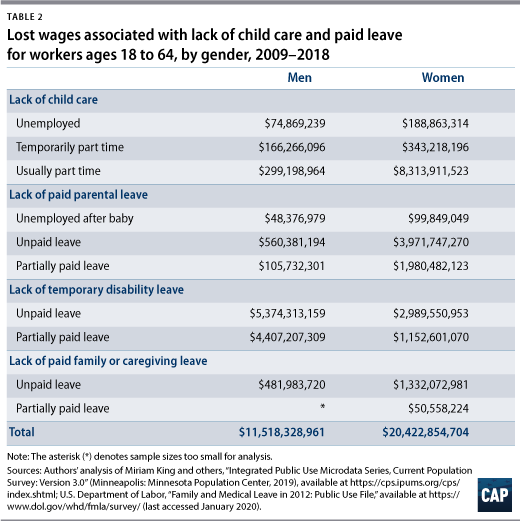A common excuse given for the lack of work-family support policies in the United States is that they would be nice to have but are “extremely costly.” This simplistic approach to understanding the fiscal and economic effect of work-family policies—looking at the total cost of benefits paid out in isolation of how they interact with other programs and benefits—ignores the many ways that these types of policy interventions can save money in other areas. For example, the passage of the Federal Employees Paid Leave Act, which will provide up to 12 weeks of paid parental leave to qualifying federal employees, is anticipated to save the federal government $50 million in costs related to employee turnover. Potential savings to businesses or other government programs are not the only factors that need to be taken into account when analyzing the true cost of work-family policy supports, however. The current narrative generally also ignores the fact that individual workers and families—especially working families of color, low-wage workers, unmarried working parents, and other vulnerable workers—are already experiencing direct hits to their income as a result of not having these policies in place. The longer Congress and the Trump administration refuse to act on work-family policies, the higher the costs to families will continue to climb.
Previous CAP analysis using data from 2005 through 2015 found that, every year, workers in the United States were losing out on at least an estimated $28.9 billion in wages due to a lack of access to affordable child care and comprehensive paid family and medical leave. This included $8.3 billion in lost wages due to a lack of child care and $20.6 billion in lost wages due to a lack of access to paid family and medical leave. These costs have only increased in the years since.
Using more recent data, from 2009 through 2018, our analysis finds that the total estimated cost to workers due to a lack of access to affordable child care and comprehensive paid family and medical leave has increased to $31.9 billion in annual lost wages.* (see Table 1) This includes $9.4 billion in lost wages due to child care problems, which encompasses those who we estimate are unemployed due to a lack of access to child care as well as those who either are temporarily or usually working part time due to difficultly accessing child care. As Congress fails to act, workers and their families also lose an estimated combined $22.5 billion in wages each year due to a lack of paid family and medical leave.

Both men and women stand to benefit from work-family supports
Although data limitations prevent us from analyzing these estimates by race or ethnicity, it is clear that men and women do not feel the effects evenly, nor are the gendered patterns constant across different types of caregiving needs. Although men consistently earn higher wages when compared with women, men as a whole lose fewer wages related to a lack of access to child care, paid parental leave, and paid family caregiving leave. (see Table 2) Working women lose an estimated $8.8 billion in potential wages due to the challenges associated with finding child care as well as an additional $11.6 billion due to lack of access to paid family and medical leave.

It is not surprising that women experience significantly higher lost wages than men, as it has repeatedly been shown that women take on the majority of family caregiving responsibilities compared with men—even when they also work for pay. Women are much more likely than men to report that they are unemployed due to child care reasons or after having a baby. Moreover, in spite of the fact that women earn less than men, on average, they report much higher aggregate lost wages as a result of their significant caregiving responsibilities. Women are also much more likely than men to take parental leave after the birth or adoption of a child. And they are more likely to take family caregiving leave to provide care to a seriously ill or injured loved one—all of which results in much higher aggregate lost wages.
However, men are much more likely to report taking unpaid or partially paid temporary disability leave to address their own serious health concerns. As a result, men lose out on more than double the aggregate lost wages of women in that category. While work-family policies are often described as women’s issues, these data show that the need for comprehensive paid family and medical leave is experienced across gender lines. In fact, the lack of national attention to the need for paid temporary disability leave has a much larger economic effect on men than it does on women. A lack of access to temporary disability leave is by far the biggest driver of lost wages for workers across the issues analyzed in this column, highlighting the importance of taking a comprehensive approach to paid leave.
Despite current inaction in Washington, comprehensive policy proposals exist
While the Trump administration may claim that it is helping working families through its policies, the hard truth remains that families are losing at least $31.9 billion in wages each year due to a lack of access to affordable child care and comprehensive paid family and medical leave. These estimates do not even begin to capture the additional effects that a lack of work-family supports can have—ranging from increased reliance on other public benefits to long-term losses in future wages and retirement security. While the administration and Republicans in Congress may pay lip service to work-family support policies, their actions consistently fall short of what working families need. Incomplete or harmful paid leave proposals that ignore the need for temporary disability and family caregiving leaves while raiding Social Security or other programs that families depend on; tax incentives that fail to encourage companies to act; and endless roundtables and listening sessions that never lead to serious policy changes are not the answer.
Strong existing legislation such as the Child Care for Working Families Act would help to support working families by limiting what they pay for child care to 7 percent of their household income—meeting the U.S. Department of Health and Human Services’ definition of affordability. The bill would also increase child care options with a particular focus on nontraditional hours and boost compensation and benefits for the early childhood workforce. In addition, the FAMILY Act is the only proposal currently before Congress that would create a comprehensive paid family and medical leave program based on proven strategies from successful state programs. It would establish a national program to provide up to 12 weeks of paid leave to workers to care for a new child or a seriously ill or injured family member or to address their own serious health concern.
The cost of inaction will only continue to increase over time until common-sense policies are enacted to ensure that working families are able to make ends meet while caring for themselves and their loved ones.
Sarah Jane Glynn is a senior fellow at the Center for American Progress.
*For more information on how these estimates were derived, please see Appendix A of the authors’ previous report, “The Cost of Work-Family Policy Inaction: Quantifying the Costs Families Currently Face as a Result of Lacking U.S. Work-Family Policies.”